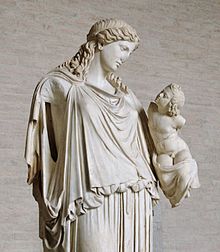| Peace | |
|---|---|
 Eirene / Ploutos (Peace and Wealth): Roman copy of a work by Cephisodotus the Elder (c. 370 BC) that once stood on the Areopagus. The Dramatis Personae in ancient comedy depends on interpretation of textual evidence.[1] This list is developed from A. Sommerstein's translation.[2] | |
| Written by | Aristophanes |
| Chorus | 1.farmers 2.auxiliary chorus of citizens from various Greek states |
| Characters |
Silent roles
|
| Setting | outside a house in Athens and later in the heavens |
Peace (‹See Tfd›Greek: Εἰρήνη Eirḗnē) is an Athenian Old Comedy written and produced by the Greek playwright Aristophanes. It won second prize at the City Dionysia where it was staged just a few days before the validation of Peace of Nicias, which promised to end the ten-year-old Peloponnesian War, in 421 BC. The play is notable for its joyous anticipation of peace and for its celebration of a return to an idyllic life in the countryside. However, it also sounds a note of caution, there is bitterness in the acknowledgment of lost opportunities, and the ending is not happy for everyone. As in all of Aristophanes' plays, the jokes are numerous, the action is wildly absurd and the satire is savage. Cleon, the pro-war populist leader of Athens, is once again a target for the author's wit, even though he had died in the Battle of Amphipolis just a few months earlier.